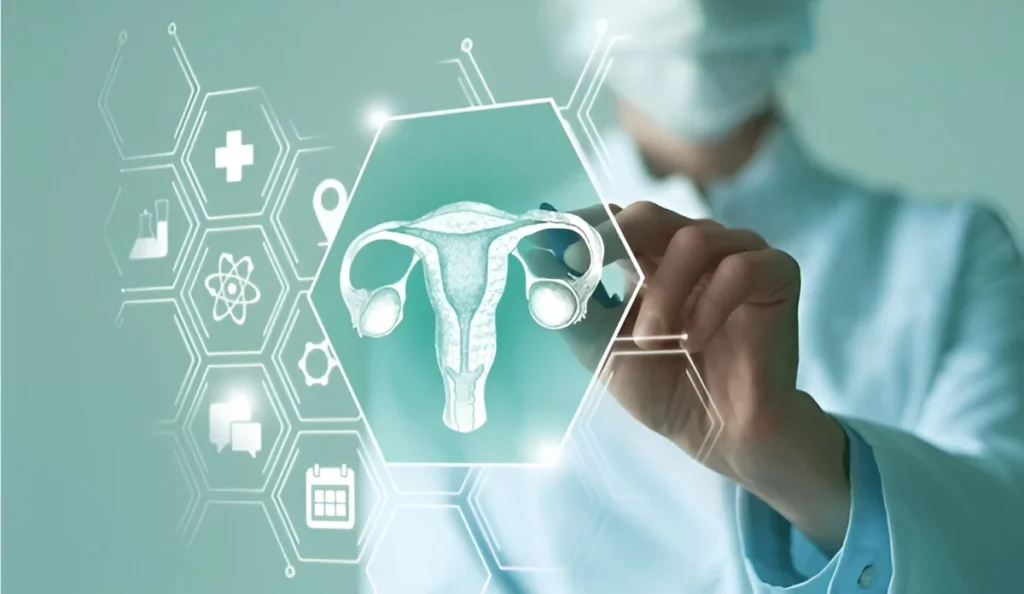-
Ganesh Talkies, Kolkata
Ganesh Talkies, Kolkata

Admins
12.07.2025
The role of Vitamin D in pregnancy is vital for both mother and baby health. A reputed gynecologist can guide you in maintaining healthy levels and preventing complications for a safe journey. Vitamin D is often called the “sunshine vitamin,” but its importance goes far beyond bone health. For women during pregnancy, Vitamin D plays a crucial role in ensuring both maternal wellbeing and healthy fetal development. Why Is Vitamin D So Important During Pregnancy?Here’s why Vitamin D matters: Supports Baby’s Bone Development Strengthens Maternal Immunity Helps Prevent Pregnancy Complications Affects Long-Term Child HealthCommon Causes of Vitamin D Deficiency in Pregnant WomenThe Role of Vitamin D in Preventing Pregnancy Complications Preventing Preeclampsia Reducing Gestational Diabetes Risk Supporting Healthy Birth WeightHow to Maintain Healthy Vitamin D Levels During Pregnancy 1. Get Moderate Sunlight 2. Include Vitamin D-Rich Foods 3. Consider Supplements (if advised) 4. Monitor Levels RegularlyThe Role of Vitamin D in Boosting Maternal and Fetal HealthFAQs About Vitamin D and PregnancyBuild a Healthier Future With Optimal Vitamin D in Pregnancy In India, studies show that a significant percentage of women of reproductive age are deficient in Vitamin D. This makes understanding its impact even more essential, especially for those planning or experiencing pregnancy. This article explores the role of Vitamin D in pregnancy, its benefits, potential risks of deficiency, and practical ways to maintain optimal levels for a safe and healthy journey to motherhood. Why Is Vitamin D So Important During Pregnancy? Vitamin D functions like a hormone in the body, regulating calcium and phosphate levels critical for developing strong bones and teeth. For pregnant women, it also influences other vital systems such as immunity, mood regulation, and even glucose metabolism. Here’s why Vitamin D matters: Supports Baby’s Bone Development Ensures the fetus develops strong bones and teeth. Helps in skeletal formation during the second and third trimesters. Strengthens Maternal Immunity Reduces risk of infections that could harm both mother and baby. Helps Prevent Pregnancy Complications Low levels are linked to preeclampsia, gestational diabetes, and preterm birth. Affects Long-Term Child Health Deficiency in mothers may lead to a higher risk of asthma and allergies in children. Common Causes of Vitamin D Deficiency in Pregnant Women Even in sunny countries like India, Vitamin D deficiency is surprisingly common. Here’s why: Limited Sun Exposure: Cultural practices, indoor lifestyles, and air pollution reduce sun exposure. Dietary Gaps: Few natural food sources contain sufficient...

Admins
07.07.2025
Cervical cancer can be detected early with the right screenings. Learn how top gynecologists and healthcare experts approach early diagnosis to improve outcomes for women. Understanding Cervical Cancer: Why Early Detection MattersWhat Causes Cervical Cancer?Signs and Symptoms to Never IgnoreHow to Detect Cervical Cancer Early1. Pap Smear Test (Papanicolaou Test)2. HPV DNA Testing3. Colposcopy4. BiopsyWho Should Get Screened?How Often Should You Get Tested?What Can You Do to Reduce Risk?Role of a professional gynecologistFAQs About Cervical CancerPrioritize Prevention, Not Panic Understanding Cervical Cancer: Why Early Detection Matters Cervical cancer is one of the few types of cancer that is highly preventable and curable when detected early. Despite advancements in women’s healthcare, many women in India still miss out on timely screenings due to lack of awareness, cultural hesitation, or fear of results. But here’s the truth: Early detection doesn't just improve treatment outcomes—it can save lives. What Causes Cervical Cancer? This type of cancer develops in the cervix—the lower part of the uterus. In most cases, it's linked to persistent infection with the human papillomavirus (HPV), a common sexually transmitted infection. Not all HPV types cause cancer, but certain high-risk strains are responsible for the majority of cases. Risk factors include: Early sexual activity Multiple sexual partners Smoking Weakened immune system Long-term use of oral contraceptives Family history of cervical cancer Signs and Symptoms to Never Ignore Early stages of cervical cancer often have no noticeable symptoms. That’s why routine screening is crucial. However, as the disease progresses, symptoms may include: Unusual vaginal bleeding (between periods, after intercourse, or post-menopause) Foul-smelling or watery vaginal discharge Pelvic pain or discomfort during intercourse Lower back pain or leg swelling in advanced stages These signs should prompt immediate consultation, especially from a gynecologist with the clinical expertise and empathy needed to guide you through early detection and care. How to Detect Cervical Cancer Early Early detection largely depends on regular screening and paying close attention to your body. Here’s how you can stay ahead: 1. Pap Smear Test (Papanicolaou Test) This is the most common and effective screening tool. A small sample of cervical cells is collected and examined for abnormalities. It can detect precancerous conditions long before they turn cancerous. Recommended for women aged 21 to 65 Usually done every 3 years If combined with HPV testing, can be done every 5 years 2. HPV DNA Testing This test checks for the presence...

Admins
03.07.2025
Annual gynecological checkups are crucial for every woman’s health. Learn why these visits and guidance from a reputed gynecologist matter today. Women’s health often takes a backseat in the hustle of daily life. Many delay routine checkups, assuming that unless there’s a pressing issue, there’s no need to visit a gynecologist. Yet, preventive care plays a vital role in detecting silent health concerns and safeguarding long-term wellness. Why Preventive Care Matters for WomenWhat Happens During an Annual Gynecological Checkup?Why an Annual Gynecological Checkup Can Save LivesBenefits of Regular Gynecological VisitsWhen Should You Start Annual Gynecological Visits?FAQs About Annual Gynecological CheckupsPrioritize Your Health Today An Annual Gynecological Checkup isn’t just about reproductive health—it’s about supporting a woman’s overall physical, hormonal, and emotional well-being. This guide explores why these yearly visits are essential, what they involve, and how expert guidance from a gynecologist can make all the difference in early detection and preventive care. Why Preventive Care Matters for Women Healthcare isn’t just about addressing illness; it’s about preventing it. In women, several conditions—like cervical cancer, PCOS, or osteoporosis—develop silently over years before showing obvious symptoms. Regular gynecological visits allow: Early identification of potential health risks Timely interventions for better outcomes Professional guidance tailored to life stages (adolescence, childbearing, menopause) Peace of mind through reassurance and awareness What Happens During an Annual Gynecological Checkup? An Annual Gynecological Checkup is a comprehensive evaluation designed to ensure every aspect of a woman’s health is functioning as it should. Here’s what it typically includes: Medical History Review: Discussion about menstrual cycles, sexual health, pregnancies, and family history of diseases. Physical Exam: General health check including weight, blood pressure, and BMI. Breast Exam: Screening for lumps or irregularities as an early step against breast cancer. Pelvic Exam: Assessment of reproductive organs to detect abnormalities like cysts or infections. Pap Smear Test: Essential for early detection of cervical cancer. STD Screening (if needed): To ensure sexual health and prevent complications. Counseling: On contraception, fertility planning, menopause, or lifestyle habits affecting hormonal balance. Each component helps build a clearer picture of overall health and empowers women to take proactive steps. Why an Annual Gynecological Checkup Can Save Lives Many serious health issues in women, such as cervical or ovarian cancer, often develop without noticeable symptoms in the early stages. Regular screenings during an Annual Gynecological Checkup can detect such conditions when they’re easiest to treat. For example: Cervical...

Admins
30.06.2025
Fertility After 30 brings unique changes to pregnancy chances. Learn what science and experienced medical professionals suggest for informed decision-making. Why Fertility After 30 Is a Topic Worth Understanding Whether you're planning your first child or considering another pregnancy, Fertility After 30 is a topic that deserves your attention. It’s not about inducing fear—it’s about informed choices. Today, more women than ever are choosing to delay childbirth due to career goals, personal readiness, or financial stability. Why Fertility After 30 Is a Topic Worth UnderstandingThe Biology Behind Fertility and AgeCommon Changes in Fertility After 301. Ovarian Reserve Declines2. Egg Quality Reduces3. Irregular Menstrual Cycles4. Higher Risk of Complications5. Longer Time to ConceiveAdvantages of Trying to Conceive in Your 30sSteps to Boost Fertility After 30✔ Track Your Ovulation✔ Maintain a Healthy Weight✔ Eat a Fertility-Friendly Diet✔ Limit Caffeine and Alcohol✔ Quit Smoking✔ Manage Stress✔ Get a Fertility AssessmentWhat About Male Fertility?Exploring Assisted Reproductive Techniques (If Needed)IUI (Intrauterine Insemination)IVF (In Vitro Fertilization)Egg FreezingHormonal TherapyFrequently Asked QuestionsQ1: Can I still get pregnant naturally after 30?Q2: Should I freeze my eggs at 30?Q3: How long should I try before seeing a specialist?Q4: Do I need IVF after 30?Q5: Can stress delay my chances of conceiving?Final Thoughts: You’re Not Late—You’re Just Right So what really happens to fertility once you’re in your 30s? What are the biological realities, and what options do you have to support conception and a healthy pregnancy? Let’s explore this through the lens of experience, expertise, authority, and trust—principles upheld by dedicated professionals in the field of women's health. The Biology Behind Fertility and Age Every woman is born with a finite number of eggs—around 1 to 2 million. By puberty, that number drops to about 300,000. And as women age, both the quantity and quality of those eggs decline. Here’s a breakdown of what typically happens: By 30: Fertility is still strong but may begin a gradual decline. By 35: The decline becomes more noticeable. By 40: Conception becomes significantly harder, and risks increase. That said, many women in their 30s have healthy pregnancies with the right guidance and support. Common Changes in Fertility After 30 Let’s take a closer look at what may shift as you move into your 30s: 1. Ovarian Reserve Declines This refers to the number of viable eggs left in the ovaries. Fewer eggs mean fewer chances each cycle to conceive. 2. Egg Quality Reduces...